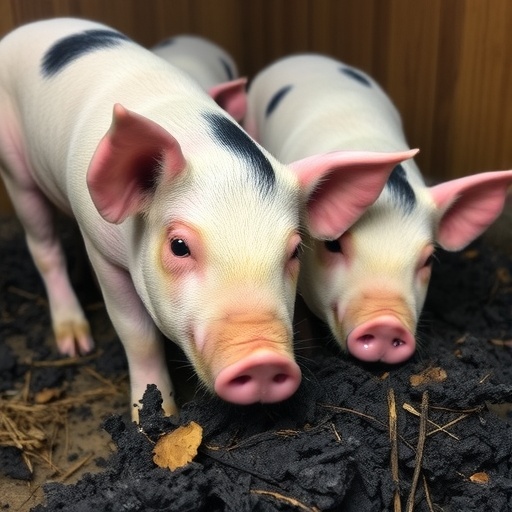The innovative study titled “Biochar-Assisted Anaerobic Digestion of Swine Wastewater: Feedstock Effects on Methane Production, Nutrient Removal, and Struvite Recovery” sheds light on an emerging approach in sustainable waste management. Conducted by a team of dedicated researchers led by A.M. Pat-Espadas, this research endeavors to integrate biochar into anaerobic digestion processes, specifically focusing on swine wastewater. This approach not only aims to enhance methane production but also strives to optimize nutrient removal and facilitate struvite recovery—a vital nutrient resource for agricultural applications.
Anaerobic digestion has garnered attention as a robust method for managing organic waste, particularly livestock by-products like swine wastewater. The method employs microorganisms to break down organic matter in the absence of oxygen, ultimately converting it into biogas, which is primarily composed of methane. While this process is efficient, recent advancements suggest that integrating biochar can significantly enhance its efficacy. Biochar, a carbon-rich material produced through pyrolysis of biomass, has shown promise in improving soil fertility and water retention, making it a valuable addition to the anaerobic digestion ecosystem.
One of the key motivations behind this research is the dire need for sustainable swine waste management solutions in agricultural practices. Swine production generates substantial quantities of wastewater laden with nitrogen, phosphorus, and other pollutants. Traditional waste management practices often lead to environmental challenges, including water pollution and greenhouse gas emissions. This study thoroughly investigates how the introduction of biochar can ameliorate these issues, ultimately paving the way for more sustainable agricultural practices.
The researchers utilized various feedstock combinations in their experiments, thoroughly analyzing the effects of each on methane production. By varying the proportions of biochar mixed with swine wastewater, they meticulously recorded how these alterations influenced biogas yield. This hands-on experimentation illustrates the dynamic relationship between biochar and anaerobic digestion processes, demonstrating the potential for enhanced methane production through optimized biochar supplementation.
Moreover, nutrient removal plays a critical role in the health of ecosystems surrounding agricultural operations. One of the unique contributions of this study is its examination of how biochar impacts nutrient cycling during anaerobic digestion. Investigating parameters such as nitrogen and phosphorus removal efficiencies, the researchers offer insights into how feedstock choices can dictate the effectiveness of nutrient extraction from swine wastewater.
An additional significant aspect of this research is the focus on struvite recovery. Struvite, a crystalline mineral composed of magnesium, ammonium, and phosphate, is considered a valuable fertilizer. The extraction of struvite from anaerobically digested swine wastewater can contribute to closing nutrient loops in agriculture. By elucidating the role of biochar in enhancing struvite recovery rates, the researchers posit that this method could revolutionize nutrient management in swine production systems.
The findings of this study possess profound implications for the future of sustainable agriculture. By successfully demonstrating how biochar-assisted anaerobic digestion can boost methane production while simultaneously facilitating nutrient recovery, the research lays the groundwork for broader applications. Transitioning to such integrated systems could mitigate environmental impacts while fostering the circular economy within agricultural sectors.
As global populations continue to rise, the quest for sustainable agricultural practices becomes increasingly urgent. This research is an excellent reminder of the latent potential lying within waste products, particularly in the context of animal agriculture. The findings advocate for renewed attention towards innovative waste management techniques that harmonize agricultural productivity with environmental stewardship.
Furthermore, support for approaches such as biochar-assisted anaerobic digestion could stimulate economic growth in rural areas. By leveraging local waste resources, farmers stand to benefit financially through the production of renewable energy and high-value fertilizers. This creates a win-win scenario, driving circularity within agricultural systems while boosting resilience against volatile market conditions.
The study underscores the importance of interdisciplinary research in tackling complex environmental challenges. By unifying principles from microbiology, agronomy, and environmental science, the researchers offer a holistic view of waste management solutions that can be tailored to specific agricultural contexts. As agriculturalists and policymakers alike seek effective strategies for enhancing sustainability, research such as this provides a critical scientific foundation upon which to build.
In conclusion, the innovative approach of integrating biochar into the anaerobic digestion of swine wastewater represents a significant advancement in sustainable agricultural techniques. Its dual focus on enhancing methane production while promoting nutrient recovery speaks to a future where waste can be transformed into valuable resources, contributing to both environmental protection and agricultural efficiency. With further exploration and refinement, this model could play a pivotal role in reshaping how animal waste is managed on a global scale.
As the agricultural landscape continues to adapt to new challenges, insights from this cutting-edge research could inspire a new era of waste management practices that align with sustainable development goals. The integration of biochar into anaerobic digestion exemplifies how scientific innovation can drive ecological balance and agricultural productivity hand in hand.
Subject of Research: Biochar-assisted anaerobic digestion of swine wastewater.
Article Title: Biochar-Assisted Anaerobic Digestion of Swine Wastewater: Feedstock Effects on Methane Production, Nutrient Removal, and Struvite Recovery.
Article References:
Pat-Espadas, A.M., Maytorena, V.M., Morales-Rosas, M.F. et al. Biochar-Assisted Anaerobic Digestion of Swine Wastewater: Feedstock Effects on Methane Production, Nutrient Removal, and Struvite Recovery. Waste Biomass Valor (2025). https://doi.org/10.1007/s12649-025-03406-w
Image Credits: AI Generated
DOI: https://doi.org/10.1007/s12649-025-03406-w
Keywords: Biochar, anaerobic digestion, methane production, nutrient removal, struvite recovery, swine wastewater, sustainable agriculture.
Tags: biochar benefits in digestionbiochar-assisted anaerobic digestioncarbon-rich materials in agricultureenvironmental impact of swine wasteinnovative waste management solutionslivestock by-products treatmentmethane production enhancementnutrient removal techniquesorganic waste managementstruvite recovery methodssustainable agricultural practicesswine wastewater treatment





